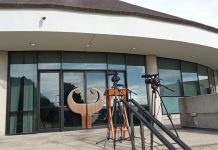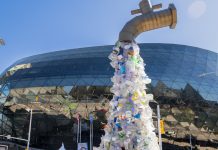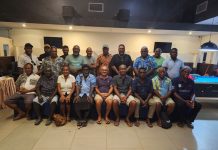National Geographic Pristine Seas dropped anchor in the Republic of Marshall Islands Tuesday to explore four of the Pacific nation’s 29 atolls, one of which the U.S used as detonation site for 23 nuclear bombs between 1946-1958.
The scientists will survey sea life in the Bikini Atoll and the neighbouring Rongerik Atoll, as well as two of the country’s most remote and northernmost isles, Bikar and Bokak.
The expedition is a collaboration among Pristine Seas, The Nature Conservancy and the Marshall Islands Marine Resources Authority (MIMRA). The expedition is funded by the Walmart Foundation, the Bezos Earth Fund, and Bloomberg Philanthropies.
“For the Marshallese, the ocean is life,” said Glen Joseph, Director at MIMRA, “Local communities rely on fish, coconuts and other plants for food and incomes. It’s critical that we closely monitor and plan for the sustainable use of our waters. More information about these remote atolls at the far end of our country is essential to realising our country’s vision for the future. I’ll never forget the pristine beauty of the Bikar and Bokak atolls, which I was honored to visit in 2019. It’s essential that we lay out plans for how to best preserve these troves of biodiversity.”
Bikar and Bokak, located within the Ratak Islands of RMI, are uninhabited and potentially still pristine. Their study of Bikini atoll, in contrast, will give the team the opportunity to examine the ability of coral reefs to bounce back decades after the most extreme human impact second only to global warming—nuclear tests.
This expedition will also be the first to comprehensively survey the little-known underwater world of Rongerik Atoll, which will be a reference site to compare against Bikini.
“The remote atolls of Bikar and Bokak may be examples of how coral reefs were hundreds of years ago, but also a blueprint for the future. They will provide a baseline for reef conservation efforts elsewhere. We’re excited to support the Marshall Islands efforts to protect these global jewels,” said Enric Sala, National Geographic Explorer in Residence and founder of Pristine Seas.
“We are also excited to survey Bikini Atoll to assess how coral reefs and all their life in them have recovered after 23 nuclear bombs were detonated on it in the mid 20th century. Bikini will give us a measure of the long-term resilience of this important ecosystem for Pacific Islanders,” said Alan Friedlander, Pristine Seas Chief Scientist.
In the wake of WWII, the United States forcibly evacuated the 167 residents of Bikini Atoll to conduct a series of nuclear weapons tests from 1946-1958 on the islands. During this 12-year period, the U.S detonated 23 nuclear bombs on Bikini, vaporising three islands and leaving behind lethal levels of radioactive contamination. Despite the U.S government’s promise to return the Bikinians to their homeland, Bikini Atoll remains uninhabitable to this day.
The international team will assess the health of the four atolls, from shallow to deep and from inshore to offshore for over a month, through visual SCUBA surveys of coral reefs and benthic environments; the deployment of Baited Remote Underwater Video Systems at 5-80 meters depth; Deep-Sea drop camera deployments up to 6,000 meters deep; seabird surveys, microplastic) sampling, and eDNA. Pristine Seas will also be utilising the DeepSee submersible to dive to 400 meters deep around the atolls.
Local researchers will collaborate closely with the scientists and filmmakers on this expedition, and government officials including Iroojlaplap (High Chief) Bokloñ Zackious (Bikar & Bokak), Mayor Tobin Kaiko (Bikar & Bokak), Mayor Anderson Jibas (Bikini Atoll) and Senator Peterson Jibas (Bikini Atoll) will visit the expedition.
The effort will support the country’s unique Reimaanlok conservation approach, a community-based system geared towards achieving local, national and global ocean protection goals. As part of this approach, coastal communities work together to design their own plans for how to sustainably and equitably use their local waters.
In 2019, divers from MIMRA and The Nature Conservancy traveled more than 60 hours by boat from the capital, Majuro, to conduct an initial ecological assessment of Bikar and Bokak. They were the first-ever divers to study these coral reefs. The government will use results from the National Geographic Pristine Seas expedition to supplement the information they have already gathered in support of ongoing management and conservation initiatives in the region.
“The Nature Conservancy is excited to support this expedition and build upon the knowledge obtained during our 2019 survey alongside MIMRA,” said Yimnang Golbuu, Coral Resilience Director for Micronesia & Polynesia at The Nature Conservancy.
“The stunning biodiversity of Bikar and Bokak was a reminder of what healthy reefs look like and why our work to restore and protect them around the world is so important. Through continued research we can gain valuable insight about reef resilience, providing RMI with more data and tools to manage and conserve the rich ecosystems and natural resources found in their waters.”
In concert with Reimaanlok, RMI recently partnered with Nature Conservancy to establish a company, Pacific Island Tuna (PIT), which supplies Walmart stores with Marine Stewardship Council-certified canned skipjack tuna for its in-house brand, “Great Value.”
Some 40 percent of the company’s net long-term income distributions will directly support community-based conservation and climate resilience projects, including the development and management of Marine Protected Areas and coral reef restoration. The remaining 60 percent will be returned to the Republic of Marshall Islands.
“For too long, the Pacific nations that supply the world with tuna have not enjoyed their fair share of the profits,” said Glen Joseph, the Director of MIMRA.
“Pacific Island Tuna transforms the tuna supply chain by ensuring that 100 percent of profits support local economies and homegrown conservation efforts in the Pacific. We want to show that sustainable tuna fishing and protection of vital ocean ecosystems is not only compatible but also beneficial to Pacific nations,” he said.
SOURCE: NATIONAL GEOGRAPHIC/MARSHALL ISLANDS GOVT/PACNEWS














